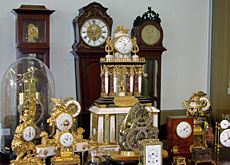
Antiquorum fires passion for watches

Auctioneer Osvaldo Patrizzi will never forget the first auction of pocket watches he organised in 1974. It was, in his words, “a technical disaster”.
But 30 years later, his auction house, Antiquorum in Geneva, is the world leader when it comes to selling the most complicated and sought-after watches and clocks.
His auctions attract collectors and dealers who are quite simply looking for the best and are prepared to pay for it. World record prices at Antiquorum auctions are nothing unusual.
Patrizzi recalls that his first auction raised about SFr1.8 million ($1.38 million), which was a considerable amount at the time.
He himself did not make any profit, but what he did gain was respect for his passion for watch and clock collecting.
Stage fright
But before the event, Patrizzi was anything but calm.
“I remember weeping with emotion, because we didn’t know exactly what was going to happen,” he told swissinfo.
There were problems with language and the German auctioneer brought in for the occasion got stage fright when he saw 200 people in front of him.
He had been used to auctions with only 20 to 30 people bidding and promptly froze.
“Finally one of our employees who could speak a few languages made the first sale… without a proper licence and without any experience. She did very well,” said Patrizzi.
“The first auction for us was, from a technical point of view, a disaster but we noticed that people actually liked this ‘naïve’ approach. And they liked the way we made our presentation,” he added.
Time to go
A watchmaker by trade, Patrizzi left his native Italy because of a law stating that no individual was allowed out of the country with more than 15,000 lira, which was then equivalent to about SFr10.
The buying and selling of clocks and watches outside Italy would have been unthinkable in such a climate, so Patrizzi decided to come to Switzerland where doing business was much easier.
And what better place to move to than Geneva, which he describes as the “temple of horology”, although Switzerland’s watch industry was in the midst of a crisis at the time.
The Swiss were slow to embrace the potential of quartz movements, which revolutionised the industry and prompted some observers to sound the death knell of the mechanical watch.
In that hostile environment, Patrizzi opened his Galerie de L’Horlogerie Ancienne, with the aim of selling pocket watches by auction or by private treaty to enthusiasts of “haute horlogerie” (fine luxury watchmaking) who were as passionate about time as he was.
“I love micromechanics. I think you can find the whole genius of a human being in it,” he told swissinfo.
Secret of success
The idea of running an auction rather than a shop has been one of the key reasons behind his success.
“It gives the collector more possibilities to see and buy different kinds of watches from different periods and from different provenances,” explained Patrizzi.
“If you have your own shop, you’re limited to perhaps 30 to 40 watches; at an auction house, you can find 300 to 500 different watches for each sale.”
Antiquorum has grown to such an extent that its auctions can now boast that they are global events.
Part of the attraction for collectors is that they can see the timepieces in lavish catalogues that not only provide a good description, but also include an estimate of the value.
“You make a catalogue, you promote the right way and you have buyers from all over the world. It’s difficult to manage, the logistics are much more complicated but it is a big worldwide event,” said Patrizzi.
Exclusivity
The rich and wealthy are Antiquorum’s main customers, and owning a unique or rare watch can be one way of sticking out from the crowd.
“People want to make a difference between themselves and the three or four other billion people in the world,” said Patrizzi.
“The watch is not only a status symbol, it also shows your cultural level. This is why people like and buy watches.”
As an author of a number of specialised books on watchmaking, Patrizzi is not easily drawn on his favourite brand but admits that he likes many.
Pushed a little harder, the names Patek Philippe, Vacheron Constantin, Rolex and Breguet come out, although he says he changes his watch practically every day.
Collector
He is, not surprisingly, a collector himself but finds it quite a job looking after them all.
“My passion – what I really like – is the relationship I have with my clocks, because they are all working and every Sunday I take half an hour to wind, check and control them,” he told swissinfo.
“I even talk with them and ask if there’s a problem when one which was out by three minutes last month is now inaccurate only by two minutes.”
His collection has two recent additions, which he bought at the company’s last auction at the end of March.
“And at a very reasonable price,” he commented with a telling smile.
swissinfo, Robert Brookes in Geneva
A grand total of SFr33 million ($25 million) was achieved at Antiquorum’s 30th anniversary April Geneva sale.
A white-gold version of the Calibre 89 from Patek Philippe (the most complicated watch in the world) went under the hammer for SFr6.6 million, making it the second most-sought-after pocket watch in the world.
Private collectors, dealers and museums all bid for the unique and rare pieces that Antiquorum offers.
Antiquorum organises four auctions a year in Geneva, four in New York and one in Hong Kong.
The auction house, Antiquorum of Geneva, which specialises in horology, is this year celebrating its 30th anniversary.
Its founder, Osvaldo Patrizzi, has built up the company by trying to reach customers directly.
Antiquorum’s auctions attract worldwide audiences who bid at auction or via the internet.

In compliance with the JTI standards
More: SWI swissinfo.ch certified by the Journalism Trust Initiative




























You can find an overview of ongoing debates with our journalists here . Please join us!
If you want to start a conversation about a topic raised in this article or want to report factual errors, email us at english@swissinfo.ch.